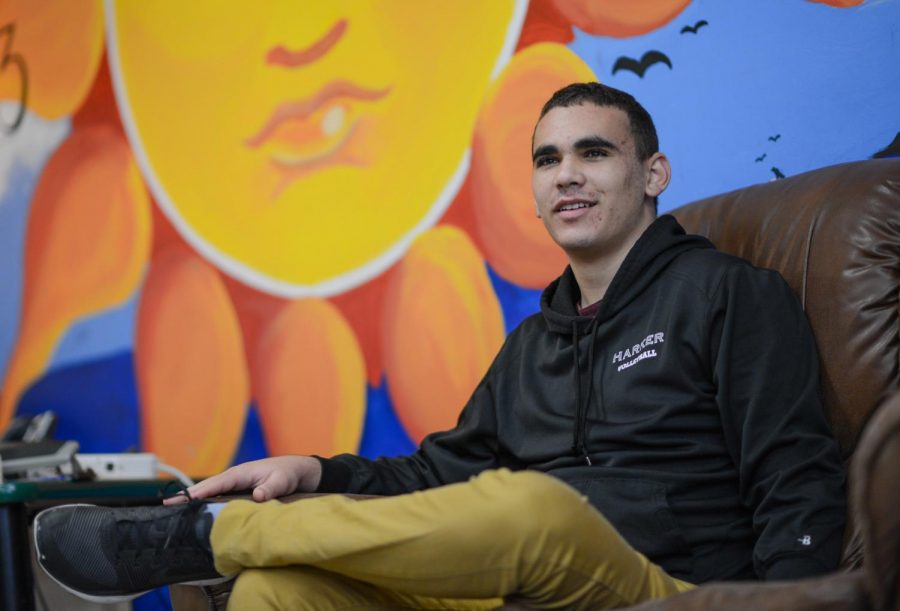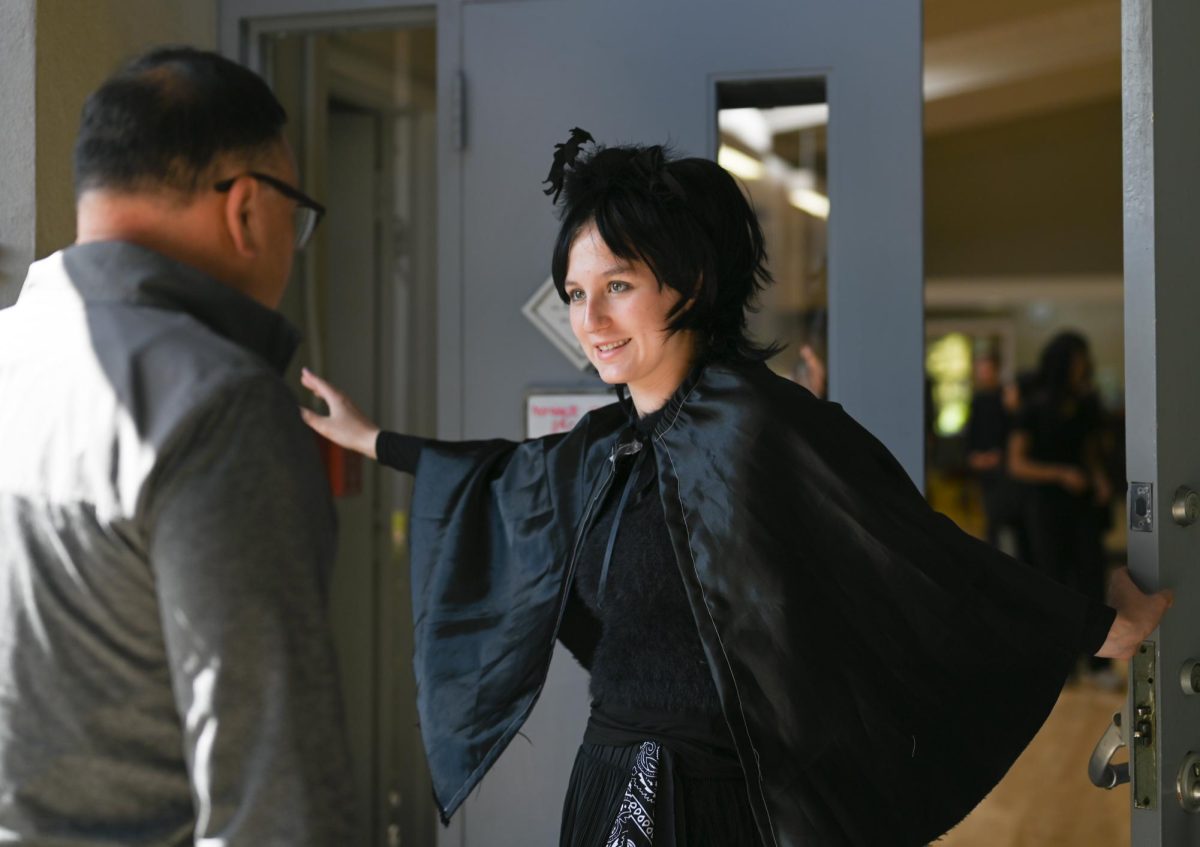Humans of Harker: Jacob Ohana backs up his arguments
“I use the word ‘fun’ a lot to describe debate, and what that means is kind of a mystery even to me,” Jacob Ohana (12) said. “Debate’s definitely not a universally agreed upon fun thing. You just get four teenagers in a room to talk really fast at each other for a while, and then somebody wins. For me, most of the fun of debate isn’t the the actual debating, it’s doing the research about it. Last year’s topic was engagement with China… I learned a surprisingly large amount about nuclear arms control agreements.”
January 12, 2018
According to Mona Lee (12), senior Jacob Ohana “dresses like an economist.” That is to say, he wears nondescript khaki pants with a convenient T-shirt — often free swag from an economics competition. On chillier days, he wears a black “Harker Volleyball” sweatshirt, a nod to his casual participation on the varsity boys volleyball team. On other days, it’s a “Harker Speech and Debate” sweatshirt.
His wardrobe reflects his innate pragmatism, as he jokes that he’s maximizing the benefit of each clothing item given its price. Or in an economist’s terms, MU/P.
“The idea that you can predict human behavior by a series of incentives is pretty fascinating,” he said. “I figure that if you just get better at predicting people’s choices, taking more factors into account, eventually it will be pretty perfect.”
But not all economics is objective — particularly in the realm of macroeconomics. Drawn to the debate, Jacob gravitates to the more politically controversial topics of governmental economic policy.
“I like how [different schools can] take the same data set that’s historically how economic policy has been, and interpret it in vastly different ways,” he said. “Like the neoclassical people decided that the only way to cause recessions was government intervention, but the Keynes people thought that the only way to prevent them was government intervention, despite both working off the exact same historical data.”
Jacob thinks that this controversy, a result of political divides, will never be truly resolved. As a policy debater, he strives to understand each side of the argument before coming to conclusions.
“There wouldn’t be debate if there were clear answers to every policy question,” he said. “What debate does is it just tries to answer the question, like: ‘We have two imperfect solutions, which one is the better one?’”
The process of finding the “better” solution involves research, and learning to distinguish reliable sources from ones with clear bias.
“You can find economics research that backs up anything, because if it’s a popular political party, they’ll have asked a think tank to do ‘research’ into it, where the research is designed to come up with the outcome they want,” Jacob said, specifying air quotes around the word “research.” “It’s pretty easy to filter out what economic information is [fake], and what stuff actually has coherent research behind it. You look at where the researchers are getting funding from, like do their conclusions rely on data, do they obviously skip over some data that seems like it would be relevant? Is there analysis that seems kind of faulty? I learned it through experience. Just a lot of debate research. It’s kind of just reading articles and being like ‘Oh yeah, this is kind of sketchy, there are no footnotes in any of this — like why?’”
To him, the joy of debate lies in this inquiry, not the thrill of competition.
“I use the word ‘fun’ a lot to describe debate, and what that means is kind of a mystery even to me. Debate’s definitely not a universally agreed upon fun thing. You just get four teenagers in a room to talk really fast at each other for a while, and then somebody wins. For me, most of the fun of debate isn’t the the actual debating, it’s doing the research about it. Last year’s topic was engagement with China… I learned a surprisingly large amount about nuclear arms control agreements.”
Jimmy Lin (12), Jacob’s debate friend and volleyball teammate, appreciates the depth of his knowledge.
“Whenever he starts doing something, whether it’s debate or volleyball, or even Spanish National Honor Society, he always gets really involved in it,” Jimmy said. “I remember walking to volleyball practice with him and he was telling me all these things about Chinese economic foreign policy, based off of his experience doing policy debate.”
Though Jacob ponders heavy topics for debate, his friends point out his less serious side, one with a dry sense of humor and a penchant for volleyball jokes.
“In our friend group , he’s the kind of guy who tends to sit back, read Reddit and eat very spicy food,” Edgar Lin (12) said.
Succinct language, humorous undertones. That’s Jacob.


















![“[Building nerf blasters] became this outlet of creativity for me that hasn't been matched by anything else. The process [of] making a build complete to your desire is such a painstakingly difficult process, but I've had to learn from [the skills needed from] soldering to proper painting. There's so many different options for everything, if you think about it, it exists. The best part is [that] if it doesn't exist, you can build it yourself," Ishaan Parate said.](https://harkeraquila.com/wp-content/uploads/2022/08/DSC_8149-900x604.jpg)




![“When I came into high school, I was ready to be a follower. But DECA was a game changer for me. It helped me overcome my fear of public speaking, and it's played such a major role in who I've become today. To be able to successfully lead a chapter of 150 students, an officer team and be one of the upperclassmen I once really admired is something I'm [really] proud of,” Anvitha Tummala ('21) said.](https://harkeraquila.com/wp-content/uploads/2021/07/Screen-Shot-2021-07-25-at-9.50.05-AM-900x594.png)







![“I think getting up in the morning and having a sense of purpose [is exciting]. I think without a certain amount of drive, life is kind of obsolete and mundane, and I think having that every single day is what makes each day unique and kind of makes life exciting,” Neymika Jain (12) said.](https://harkeraquila.com/wp-content/uploads/2017/06/Screen-Shot-2017-06-03-at-4.54.16-PM.png)








![“My slogan is ‘slow feet, don’t eat, and I’m hungry.’ You need to run fast to get where you are–you aren't going to get those championships if you aren't fast,” Angel Cervantes (12) said. “I want to do well in school on my tests and in track and win championships for my team. I live by that, [and] I can do that anywhere: in the classroom or on the field.”](https://harkeraquila.com/wp-content/uploads/2018/06/DSC5146-900x601.jpg)
![“[Volleyball has] taught me how to fall correctly, and another thing it taught is that you don’t have to be the best at something to be good at it. If you just hit the ball in a smart way, then it still scores points and you’re good at it. You could be a background player and still make a much bigger impact on the team than you would think,” Anya Gert (’20) said.](https://harkeraquila.com/wp-content/uploads/2020/06/AnnaGert_JinTuan_HoHPhotoEdited-600x900.jpeg)

![“I'm not nearly there yet, but [my confidence has] definitely been getting better since I was pretty shy and timid coming into Harker my freshman year. I know that there's a lot of people that are really confident in what they do, and I really admire them. Everyone's so driven and that has really pushed me to kind of try to find my own place in high school and be more confident,” Alyssa Huang (’20) said.](https://harkeraquila.com/wp-content/uploads/2020/06/AlyssaHuang_EmilyChen_HoHPhoto-900x749.jpeg)










